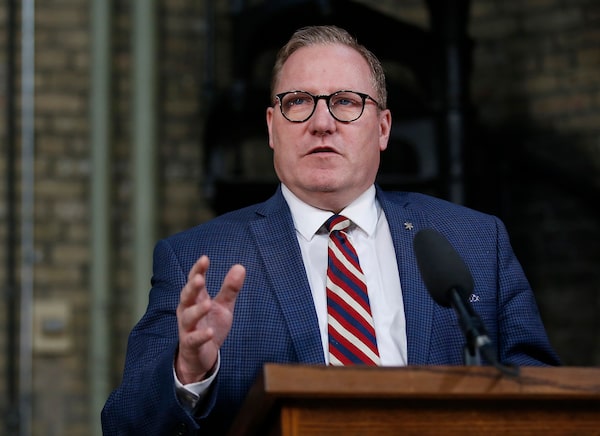
Manitoba Finance Minister Scott Fielding speaks in Winnipeg, on March 15, 2019. On the spending side, the government dished out $323 million less than anticipated on infrastructure projects.JOHN WOODS/The Canadian Press
Manitoba’s Progressive Conservative government is projecting a lower deficit for the fiscal year that ends March 31 thanks in part to higher income-tax revenues and lower infrastructure spending.
In a third-quarter fiscal update Tuesday, the government said it is forecasting a deficit of $325 million — $35 million lower than predicted in last spring’s budget.
The positive financial news was pushed partly by corporate income tax revenues, which were tracking $101 million higher than expected.
“What that really is a sign of is a resilient Manitoba economy,” Finance Minister Scott Fielding said.
On the spending side, the government dished out $323 million less than anticipated on infrastructure projects.
A large flood-prevention channel to manage water levels on Lake St. Martin is behind schedule, so less money was spent on it. The province also spent less than expected on new schools and information technology in the health sector, Fielding said.
The reduced red ink brings the government closer to its promise to balance the budget before the next election, which is slated for 2023. The former NDP government started running a string of deficits in 2009 despite sharp tax increases and the Tories swept to power in 2016 on promises to cut taxes and control spending.
Critics have accused the Tories of cutting the deficit on the backs of the needy, because some cuts have affected subsidies for sleep-apnea machines, public housing and other items. Three hospital emergency departments in Winnipeg have been converted into urgent-care centres, which do not deal with life-threatening ailments such as heart attacks.
The province has also transferred some services, such as its air-ambulance planes, to the private sector.
Fielding, who is to deliver a budget next week for the coming year, said efforts to contain costs — including possible further privatization — must continue.
“We’re absolutely going to continue to make sure we can be as efficient and as effective with taxpayer dollars as we can.”
Politicians are to return to the legislature Wednesday for a spring sitting that is expected to focus largely on education reform.
The government hired consultants to conduct a review of schools and has already hinted that the number of school divisions across the province could be reduced.
Lead consultant Avis Glaze produced a report for the Nova Scotia government in 2018 that led to the province replacing elected English-language school boards with a 15-member advisory council.
Our Morning Update and Evening Update newsletters are written by Globe editors, giving you a concise summary of the day’s most important headlines. Sign up today.